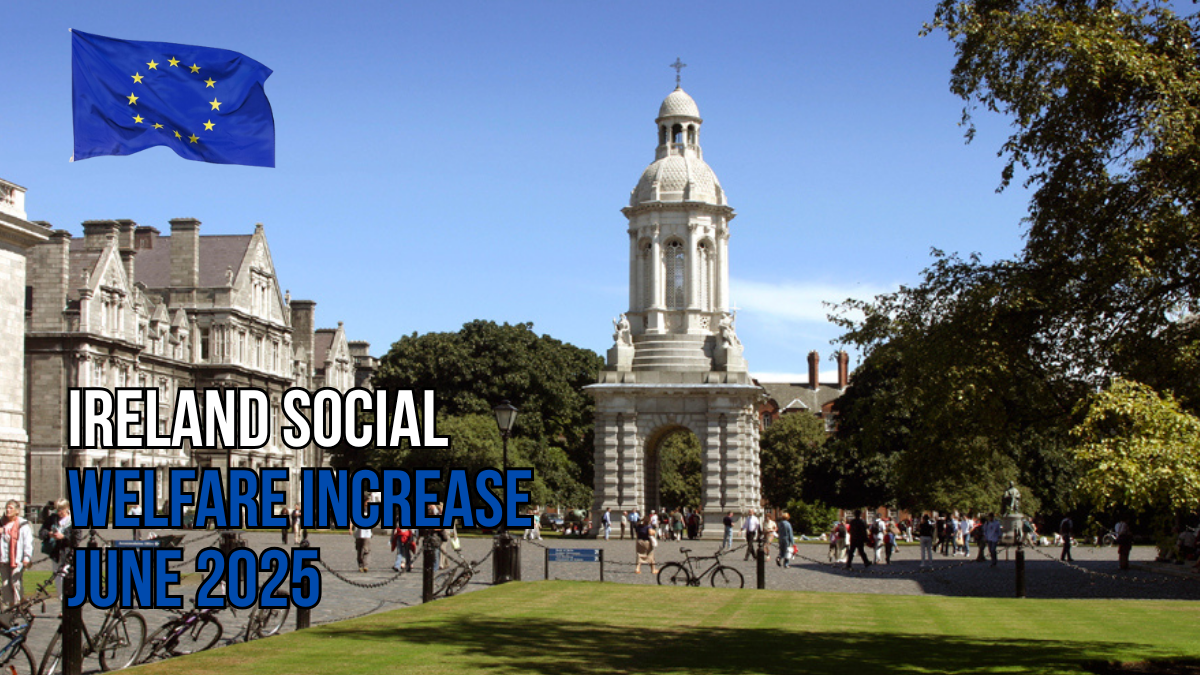In a significant financial uplift for many Irish households, the Irish Government has officially approved a substantial increase in social welfare payments, starting March 1, 2025. This change, announced by Minister for Social Protection Heather Humphreys as part of Budget 2025, marks the largest social welfare allocation in the history of the country. More than 1.4 million people are set to benefit from these changes, with special provisions for qualified adults and children.

Summary Table: Ireland Social Welfare Increase June 2025
| Category | Details |
|---|---|
| Country | Ireland |
| Announced By | Minister for Social Protection, Heather Humphreys |
| Department | Department of Social Protection |
| Effective Date | March 1, 2025 |
| Standard Weekly Increase | €12 |
| Child Benefit Increase | €4 per week |
| Qualified Child (Under 12) | Increase from €42 to €46 |
| Qualified Child (12 and Older) | Increase from €50 to €54 |
| Official Site | www.gov.ie |
Overview of the Social Welfare Increase
Starting from March 1, 2025, all weekly social welfare payments have seen a baseline increase of €12. Individuals receiving reduced payments and those with adult dependents will receive proportionate increases. These adjustments aim to help households manage the rising cost of living, while promoting a fairer welfare system across Ireland.
Specific Welfare Program Adjustments
1. Domiciliary Care Allowance
The monthly domiciliary care allowance has increased by €10. Moreover, child benefit payments will now extend to every 18-year-old who remains in full-time education. Previously, this payment was only made until the child’s 18th birthday, regardless of educational status.
2. State Pension Reform
From March 2025, individuals now have the option to delay retirement up to age 70. This move benefits those who have not accrued enough PRSI contributions to qualify for the full state pension. For each additional year worked beyond the age of 66, a 5% increase will be applied to the weekly pension amount.
3. Working Family Payment Thresholds
To counterbalance the national minimum wage increase to €12.70 per hour, the income threshold for the Working Family Payment has been raised by €54 per week. This adjustment ensures families already receiving benefits continue to qualify without penalty.
4. Community Employment & Related Programmes
Participants in the following employment schemes will receive a weekly increase of €12:
- Community Employment (CE)
- Tús Programme
- Rural Social Scheme
- Work Placement Experience Programme
5. Energy Credits
As part of energy relief efforts, a second credit of €150 will be automatically applied to household accounts starting March 1, 2025. This initiative targets rising energy costs during winter and spring.
6. Support for Students
In addition to general welfare increases, over 50,000 students can expect their financial grants to rise by more than €300 for the academic year commencing in March. Postgraduate grants are also expected to receive significant enhancements.
Child Benefit Revisions
A child under 12 will now receive €46 weekly, up from €42. For those aged 12 and above, the amount increases from €50 to €54 weekly. These changes are implemented to provide additional support to families with growing children and rising educational costs.
Additional Measures
One-Time Double Payment
At the end of March 2025, a one-time double weekly social welfare payment will be issued to all recipients who qualify for the Christmas Bonus. This bonus will be based on the newly increased payment rates.
PRSI Contributions
There will also be a modest increase of 0.1% in PRSI contributions from workers. This measure is part of the long-term plan to stabilize the Social Insurance Fund.
Taxation Updates
Although income tax rates of 20% and 40% will remain unchanged, the Government has proposed changes to tax credits and bands for the year 2025. These changes aim to further ease the financial burden on lower and middle-income households.
Purpose and Impact of the Welfare Increase
According to the Department of Social Protection, these increases represent a targeted strategy to provide more robust financial support for low-income families. The overall welfare expansion is intended to offset inflationary pressures and ensure equitable distribution of resources, especially in light of rising living expenses.
Families with children, elderly pensioners, caregivers, students, and those engaged in employment schemes are among the primary beneficiaries. With additional funding and policy flexibility, Ireland seeks to modernize its welfare system and expand its reach to underserved populations.
Frequently Asked Questions (FAQs)
Q1. When will the new welfare payments begin?
A: The increased rates took effect on March 1, 2025.
Q2. Who is eligible for the €12 increase?
A: All recipients of standard weekly social welfare payments, including reduced-rate recipients and qualified adult dependents.
Q3. Will students receive additional support?
A: Yes, over 50,000 students are expected to receive increased grant support starting March 2025.
Q4. What is the second energy credit?
A: A €150 energy credit applied to household bills starting March 1, 2025.
Q5. Is there a change in pension eligibility?
A: Individuals can now defer retirement until age 70 and receive a 5% increase in state pension for each additional year worked.
Q6. Where can I find more information?
A: Visit the official government site: www.gov.ie
Conclusion
Ireland’s 2025 social welfare increase is more than a policy update—it reflects a broader commitment to inclusivity, economic equity, and household stability. With thoughtful revisions to various programs and expanded eligibility criteria, the Irish Government aims to deliver both immediate relief and long-term benefits to its citizens.
Stay informed on all official updates and detailed guidance by visiting the Department of Social Protection’s official portal: https://www.gov.ie/en/organisation/department-of-social-protection/
Click here to know more